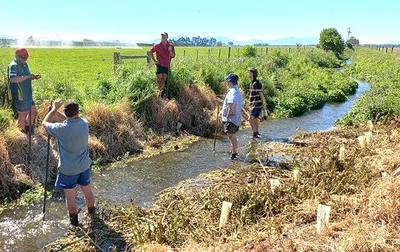Good progress in lower Hinds catchment

An Environment Canterbury (ECan) study of water quality in the Hekeao/Hinds catchment shows the impressive work that’s being carried out, says ECan zone delivery lead for Ashburton, Henry Winchester.
“This review is a way to take stock and re-set.
“It’s a way of checking on the work and helping the working party to get on top of things,” he said.
The working group looked at each of the 16 recommendations made in 2016 by the Hinds Drains Working Party (HDWP), to see how many had been followed through on.
The HDWP was formed in 2014 by the Ashburton Water Zone Committee. It was given the job of organising plans for the main water bodies of the Lower Hinds Plains. The committee worked with HDWP members to carry out the recommendations.
In June 2022, on behalf of the HDWP, ECan gave a five-year progress report of the jobs completed.
The recently formed Hekeao Hinds Lowlands Catchment Group (HHLCG) was now focused on improving the drains. The group had applied for funding from Ministry for Primary Industry’s (MPI) Freshwater Fund, which helped members to ramp up their activity in the Hinds catchment.
Winchester said’ “We often hear about the problem – but this was a chance to look at the ‘doing’ and it’s impressive. Take the managed aquifer recharge (MAR) for example. This is world-class research that can now be used anywhere in the world.”
He also wanted to highlight the role that the community had played.
“These ideas rely on landowners wanting to give things a go like having weirs in their drains, and new ways of stock management,” he said.
Local farmer and chair of the HDWP, Craig Fleming, was among those who’d been happy to make changes to his on-farm processes to help the environment.
His long list of work included riparian plantings, fitting a border deflector to prevent fertiliser entering the drains, making plans for winter grazing to protect drains, and making sure irrigation screens met standards for fish protection.
He thought the way in which various groups had come together during the HDWP process had given farmers the go-ahead that their environmental actions were on track.
“We all have an interest in improving water quality.
"The remedies are tricky and will take time, but I really think farmers want the best for the environment around them,” Fleming said.
